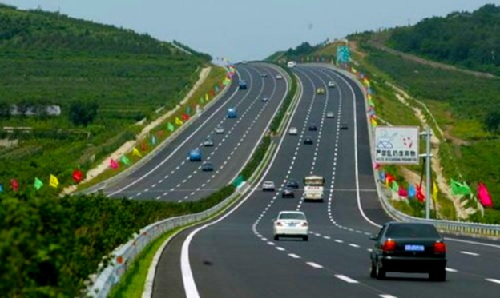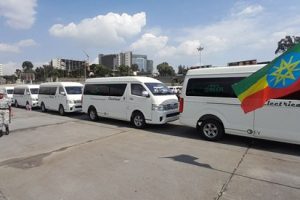
BY LAKACHEW ATINAFU
Confronting myriads of challenges both manmade and natural, Ethiopia has begun to wow the world in infrastructure development particularly in road construction, according to the FDRE Prime Minister Abiy Ahmed’s (PhD) reaction to members of the 6th House of People’s Representatives (HPR) on its first year 13th regular session held recently.
Most notably, one of the sectors that have scored astonishing result is the road construction sector carried out by the Ethiopian Road Administration (ERA). As everybody knows, Ethiopians have reach experience of walking difficult terrains on foot even though winning Marathon on heart fully.
It is a short term memory, that Ethiopia has experienced a good stride in making citizens guide in a good stride. As the response of Abiy Ahmed to the members of the parliament, the country has registered glittering success in terms of infrastructure development in which road construction takes remarkable share.
On top of applauding the country’s head and heart, members of the parliament representing Ethiopians, raised concrete questions. Among the questions the members of HPR raised was that focused on road infrastructure. Resembling blood, the fluid that circulates in the heart, arteries, capillaries, and veins of a vertebrate animal carrying nourishment and oxygen, roads serve the public in earning own life and building the nation via stimulating the economy.
Thus, lack of roads, as of the person who raised the question, affects not only people in the rural areas, but also anyone in every corner of the country and the nation’s economy by large. On his response, the premier addressed the questions in detail providing tangible indications including the achievements in road construction.
In that Parliament, the road and infrastructure sector was highly reinforced as it was expressed by the Prime Minister. As it has been clearly explicated by the head of the government, the road development has reached a promising level as it has been mentioned the instances implemented in East and West Gojjam zonal administrations of Amhara Regional State.
Approached by The Ethiopian Herald, Hailu Belay, an Investor and Business Consultant said that the transport sector is an important component of the economy; impacting on both the domestic and intentional arena of development.
Road transportation penetrates further into the nooks and cranny of human toil than other means of transportation. The presence of an adequate, reliable and efficient transport system is a critical factor in local economy linking domestic products to the available oversea market.
A well-developed transportation infrastru cture provides adequate access to the destitute and has a power to reinforce law and order and benefit locals which in turn is a necessary condition for the efficient operation of lucrative businesses like manufacturing, retail, labor and housing markets.
Transportation is a wealth creating industry on its own as well as the life-line of an economy. “If we see our country’s problem it is likely associated with transport as the country and statesmen only focused on demarcating the people at ethno lingual factor escaping from the fact the time demands,” Hailu said.
Documents tell that indeed, the provision of a high quality transport system has been identified as a pre-condition for the full participation of remote communities in the benefit of national development transportation opens up new areas of economic activities; increases agricultural production and productivity; revitalizes trading activities and impacts positively on urbanization process.
Although there are other means of transportation and logistics such as air, rail and water, these means of transportation would have been greatly incapacitated and could not be easily affordable for the majority of the public but for the complementary role is played by road transport in the economy.
The smart move which is being initiated by the new administration of Abiy Ahmed in investing in road transportation is indeed the lifeline of the economy in the local regions. Inadequate transportation limits a nation’s ability to utilize its natural resources; limits security forces to enforce law and hinders activities of public offices like agriculture, health and others to address the community with necessary facilities and could be a drawback for the incumbent from execution capacity. This also has an adverse impact on integrating the manufacturing and agricultural sectors; and supplying educational, medical and other infrastructural facilities.
There is still the need therefore to maintain and improve the existing road transportation so as to build Ethiopia which ironically can be the symbol of African independence and freedom. To this end, according to the explanation of Abiy to the house of the parliament, the country aspires to further expand road transport and thereby to link production areas to overseas markets.
On the impact on local economies, highway expenditures have been found to help increase rural employment, particularly in manufacturing and the mobility of citizenry, retail industries. Studies have also clearly shown that the construction of new highways tend to benefit rural parts of the country near the metropolis. This, however, was not the first such edifice built in nineteenth century.
Ethiopia, in 1884, King Teklehaymanot of Gojam had erected a bridge over the Tamchi River, a tributary of the Blue Nile. It was constructed under the direction of an Italian, Count Salimbeni, and was a miracle of improvisation. Salimbeni recalled that the workers did not take readily to the discipline of manual work. However, the King was anxious to forward the project so that he himself lent a hand. By carrying stones he succeeded in breaking down the general reluctance to engage in manual work.
The supply problem was also difficult. Limestone had to be carried a distance of three days’ journey. Trowels were made out of the engineers’ frying pans, hammers out of local ploughs, and rope out of twisted cow gut, while bamboos were set in straw-strengthened mud to serve as scaffolding.
Notwithstanding the success of the Tamchi Bridge there is said to have been much discussion before Menilek’s Awash Bridge was subsequently decided upon. According to international logistic group (Ilg), who may however exaggerated the extent of the opposition in order to enhance his own role in the proceedings, Menilek II was at first skeptical when the Swiss engineer proposed the erection of a bridge without poles.
According to further documents obtained from publication of ERA, the success of socio-economic development programs initiated by the Government and the people of Ethiopia and terrain lands is seriously constrained by the absence of adequate, reliable and efficient road transport and logistics that forced the nation to dwell on foot and horsebacks.
The Ethiopian Herald June 19/2022





